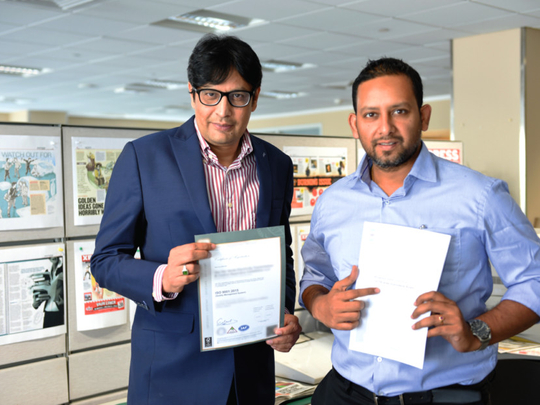
DUBAI: Like millions around the world, if it’s an ISO certificate that makes you pick a product or service, then wait till we tell you about its dark side.
Under normal circumstances the much trusted and globally recognised stamp is awarded only after a detailed audit and compliance survey which takes weeks, if not months. But here in the UAE you can have it for as little as Dh4,000 and within three days.
An XPRESS undercover operation blew the lid off the well-oiled racket when we got the coveted ISO 9001:2015 certificate for a company that shut down long ago and, worse, is under investigation for fraud.
Posing as directors of the defunct electrical firm VDH whose real owners are on the run, we approached a government-accredited agency in Karama authorised to issue ISO certificates in the UAE.
All we had to provide them was a copy of VDH’s trade licence, an email address, phone number and yes, some cold hard cash.
Less than 36 hours later we had the certificate in our hands. In fact, representatives of the accredited agency even happily posed with us for pictures while handing it over at a ceremony in their office. “Congratulations sir, now you are ISO certified. You can have it framed for your office and impress your clients,” the company’s Indian representative announced with a cheeky smile.
Bogus audit
If this was not shocking enough, they even gave us an exhaustive 13-page audit report detailing how their officers assessed VDH’s operations at their facility and found it to be compliant with ISO standards on various parameters. (Scroll down for audit report details). Of course, none of this happened and couldn’t, even if the auditors had wanted, because VDH doesn’t exist.
As it turns out, the audit report was a one-size fits all template certificate mills have been blatantly giving out to clients for years. In the process, no accreditation guidelines are adhered to; you pay them, they print you a certificate. What they lack in morals, they simply make up for with the toner.
While actual numbers are hard to come by, it’s believed that due process was not followed in around 40 per cent of the ISO certificates issued to companies and government agencies in the UAE.
“And this is a conservative estimate,” says an industry insider who alone claims to have issued close to 700 dubious certificates across several industries in the region. “That’s about Dh16 million worth of business over a period of five years from just one sales team,” he said, requesting anonymity.
There are as many as 39 government-accredited certification bodies in the UAE. XPRESS found out that nearly one-third of them flout basic norms and guidelines and will issue a certificate to just about anyone who wants it.
“ISO certificate? No problem. We will give it. It will take three days and cost Dh5,000. So when can we meet?” a Filipina sales executive of another company we found out about after a simple online search for ‘ISO in UAE’ said over the phone.
Curiously, some of these accredited bodies are not even based in the country. They don’t necessarily have to be. Their agents fly into the UAE on visit visas every few months to peddle ISO certificates in industrial areas like Al Quoz and Jebel Ali.
“We start from the moment we set foot here,” said the staff of one such agency headquartered in New Delhi, India. “With Expo 2020 round the corner and so many tenders up for grabs, companies are desperate for ISO certificates and so are we,” he added. An ISO certificate gives an organisation an unrivalled edge over competitors. Besides strengthening bids for lucrative tenders, the certification has numerous additional benefits. Since the ISO standards are recognised and valued internationally, the certification adds credibility and opens up vast business opportunities.
But getting an ISO certificate through the proper process isn’t easy. Sure enough, organisations that do not measure up to ISO’s stringent requirements resort to devious means which is not only quicker but also cheaper. Sadly, the certificate is just as bonafide as one obtained by genuine methods. This explains why around Dh20 million worth of such certificates are issued in the region annually with no audits or checks.
“Most entities have taken them knowingly but then there are many who have taken them unknowingly as they are not aware of what ISO certification entails. It’s this ignorance certification mills prey upon,” said an executive of a global leader in testing, inspection and certification. “What you got for Dh4,000 in three days would have cost around Dh30,000 and taken months of rigorous compliance. These shady operators bring a bad name to the industry and harm the business of premium certification bodies like us,” he added.
In real sense, getting a certificate like ISO on the sly is like earning a prestigious MBA degree without ever going to a business school.
As we walked out with the ISO certificate, that’s exactly what we felt. Never mind we are now eligible to bid for tenders. Imagine if VDH were for real.
13-page report for an audit that never was
If the prestigious ISO 9001 2015 certificate is anything to go by, then electrical firm VDH should carry a lot of credibility in the market.
Fact is nobody would even want to touch it with a barge pole. VDH’s real owners (not us!) are wanted for duping scores of UAE traders out of millions of dirhams and the company’s Al Garhoud office in Dubai has remained shut for months.
But the body that certified it would have you believe otherwise.
Their backdated 13-page audit report claims VDH was ‘assessed’ in September 2016.
That’s weeks before we even contacted the accreditation body.
The art of faking it
At a time when fraud victims were desperately looking for VDH staffers who had disappeared after issuing dud cheques, the auditors supposedly visited the company’s facility to ‘determine the level of implementation of the organisation’s management systems based on the requirements given in the relevant management systems standard audit criteria’.
Not just that, the audit team even “conducted a system/process-based audit focusing on the significant process/aspects, risks and objectives”. The audit methods used were interviews, observations of activities, sampling and review of documentation and records, says the report.
Conforming to standards
The team also noted that throughout the audit process, VDH management system demonstrated ‘overall conformance with the requirements of the audit standard’.
According to the report, all major areas of operations were verified by collecting representative samples; for HR, Management Representative, Operations and Maintenance.
“In general, the Management System found in compliance with the requirements of audit criteria of the auditing standard,” the report concluded.
HACCP certificates also up for sale in the UAE
The next time you buy bread or grab a juice bottle from a supermarket shelf because of its HACCP mark, take a moment to look beyond it.
The famous green logo of the Hazard Analysis and Critical Control Points, or HACCP as it is commonly called, may just be a glorified rubber stamp.
For the uninitiated, HACCP is a systematic preventive approach to food safety, and designs measurements to reduce biological, chemical and physical hazards in production processes to a safe level. Its certification involves seven basic but rigorous steps from conducting hazard analysis to identifying critical control points to establishing corrective actions.
But like ISO, even HACCP certifications in the UAE are issued without proper checks.
If you have anything remotely to do with food, you can buy it for Dh5,000. That’s precisely what the staff of the company that sold us the ISO 9001 2015 certificate told us when we approached him posing as ownners of the defunct electrical firm VDH. “The scope of activities of your company doesn’t include anything to do with food, so it will be difficult because of strict regulations in Dubai. But if you can fix that, we will do it within 10-15 days,” he said during our sting operation.
For regulators, industry insiders and consumers, HACCP should ideally mean a hallmark of excellence, a seal of approval from the highest governing body that lays down industrial standards that are not easy to come by. However, in certain cases getting the certificate was as simple as renewing a newspaper subscription.
An industry insider told XPRESS how they once certified a two-man bakery operating out of a villa in Dhaid. “All that they had was a big oven and a plastic bag sealing machine. Even the most basic requirements of hygiene and sanitation were missing,” he recalled.












